Across industries, AI chatbots are transforming how businesses handle customer interactions. By automating up to 80% of routine queries, they reduce costs, improve efficiency, and free up human teams for complex tasks. But with so many platforms available, choosing the right one can be overwhelming.
Here’s a quick breakdown of the 10 best AI chatbot platforms in 2025:
- Quidget: Affordable and easy-to-use, ideal for small businesses with multilingual support and CRM integrations.
- ChatGPT (OpenAI): Known for its conversational abilities, great for content creation and general queries.
- Gemini (Google): Handles both text and images, perfect for businesses already using Google tools.
- Claude (Anthropic): Focused on safe, reliable communication, great for industries like healthcare and finance.
- Perplexity AI: Combines conversational AI with live web search for real-time, accurate answers.
- Intercom: Balances live chat and automation, designed for scaling customer support.
- Birdeye: Tailored for reputation management, helping businesses manage reviews and feedback.
- Tidio: Popular with small e-commerce businesses for real-time chat and sales assistance.
- Drift by Salesloft: Built for B2B sales, excels at lead qualification and conversational marketing.
- Freshchat by Freshworks: Offers omnichannel support with advanced sentiment analysis and seamless platform continuity.
Each platform caters to different needs – whether it’s automating customer support, improving lead generation, or managing feedback. Some, like Quidget and Tidio, are beginner-friendly and cost-effective, while others, like Drift, target enterprise-level operations.
Quick Comparison Table:
| Platform | Starting Price | Best For | Key Features |
|---|---|---|---|
| Quidget | $16/month | Small businesses | Multilingual, no-code, CRM integration |
| ChatGPT | $20/month | Content creation, general use | Advanced reasoning, API access |
| Gemini | Free (Paid TBD) | Google users | Text/image inputs, Google integration |
| Claude | $20/month | Sensitive industries | Safe communication, handles long texts |
| Perplexity AI | $20/month | Research, fact-checking | Live web search, source citations |
| Intercom | $39/month | Scaling customer support | Workflow automation, CRM integration |
| Birdeye | Custom pricing | Reputation management | Review automation, feedback analysis |
| Tidio | Free ($29/mo) | E-commerce stores | Shopify integration, real-time chat |
| Drift | $2,500/month | B2B sales | Lead qualification, sales automation |
| Freshchat | Free ($15/mo) | Omnichannel support | Sentiment analysis, cross-platform chat |
Choose the platform that aligns with your goals, budget, and technical needs. Many offer free trials, making it easy to test before committing.
13 Best AI Chatbots in 2025 (Ranked by Best Use Cases)
What Are AI Chatbot Platforms and Why Do They Matter?
AI chatbot platforms are tools that enable businesses to create, deploy, and manage chatbots driven by artificial intelligence. Using natural language processing (NLP), these platforms provide real-time, conversational responses that feel human.
The gap between basic bots and advanced AI platforms is huge. While basic bots rely on decision trees or keyword triggers for pre-scripted replies, advanced AI chatbot platforms can understand complex questions, interpret context and intent, and even learn from past interactions to improve their performance.
The Power of Modern AI Chat Platforms
Today’s AI chatbot platforms are versatile, taking on tasks like customer support, sales assistance, lead qualification, onboarding, and automating FAQs – all at the same time. For instance, platforms like Ada handle intricate customer queries in over 100 languages, while Botpress allows businesses to train bots on their own knowledge bases and integrate with tools like Zendesk and Zapier.
These platforms don’t just stop at answering questions. They connect with CRM systems, helpdesk software, and analytics tools to deliver personalized responses based on customer history. This integration enables businesses to elevate the way they interact with their users, combining efficiency with a tailored experience.
Why Businesses Are Making the Switch
The advantages of AI chatbot platforms are undeniable. With 24/7 availability, they ensure customers get assistance at any time, even outside regular business hours. This round-the-clock support can significantly cut costs by reducing the need to hire larger support teams.
In 2025, the AI chatbot market recorded nearly 100 billion visits, with a staggering 123.35% year-over-year growth. Impressively, the top 10 chatbots alone accounted for 58.8% of all traffic. These numbers show just how central chatbot platforms have become in digital customer engagement.
AI chatbots also boost customer satisfaction by delivering faster, more accurate responses. They can manage high volumes of requests simultaneously, reducing wait times and allowing human agents to focus on more complex issues. When a situation requires human involvement, advanced platforms ensure a seamless handoff by transferring the full chat context, so customers don’t have to repeat themselves. The key is finding a platform that aligns with your business goals and operational needs.
The Multimodal Advantage
Modern platforms go beyond text-based interactions. Tools like ChatGPT, Claude, and Gemini now support voice inputs, analyze images, and maintain context across different interaction types. For example, a customer can send a photo of a damaged product and instantly receive instructions for returns or repairs.
The ability to integrate seamlessly with existing business systems is a game-changer. It’s no longer just about having smart AI – it’s about how well the chatbot can solve real-world challenges while fitting into a company’s workflows. Businesses are shifting from simple, rule-based bots to AI-powered platforms that handle complex, multi-step reasoning and work in harmony with their operational systems.
1. Quidget – AI Agent Builder for Customer Support & Sales
Quidget is a standout among AI chatbot platforms, combining customer support, sales, and onboarding tools into one efficient solution.
Designed with small teams in mind, Quidget allows businesses to automate customer support in just minutes. Backed by SupportYourApp – an Inc. 5000 award-winning company with over 14 years of experience in outsourced support – Quidget brings deep expertise to AI-powered automation.
The platform is built to reduce support tickets and costs while freeing up human agents to handle more complex issues. Unlike basic chatbots that rely on rigid scripts, Quidget’s AI agents can be trained on your business’s unique data and deployed across websites, apps, or as standalone assistants.
Core Use Case
Quidget is tailored for three key business needs: customer support, sales, and onboarding.
- It automates responses to common customer queries, making it easier to resolve routine issues quickly.
- It helps qualify leads, ensuring your sales team focuses on high-value prospects.
- It streamlines onboarding by guiding new users through processes step by step.
By handling repetitive tasks, Quidget allows your team to focus on more strategic and complex challenges.
AI Features
Quidget is packed with features designed to make it both powerful and user-friendly.
- It supports custom training to answer company-specific questions in over 45 languages, making it a great fit for businesses with a global audience.
- Features like context retention and intent recognition ensure smooth, natural conversations, while routing inquiries effectively.
- A no-code interface means you don’t need technical expertise to create and manage chatbots.
One standout feature is its ability to train AI using your website’s content. With web crawler functionality, Quidget can automatically build a knowledge base from your existing resources, saving you time and effort.
Integrations
Quidget connects seamlessly with popular tools to enhance its functionality:
- CRMs: Integrates with platforms like Salesforce and HubSpot to keep customer data organized.
- Messaging apps: Works with WhatsApp, Slack, Telegram, and Viber for multi-channel communication.
- Analytics tools: Tracks and analyzes interactions to improve performance.
- Zendesk: Simplifies support ticket management.
- Calendly: Lets users schedule meetings directly within AI-driven conversations.
For advanced needs, Quidget offers API access on higher-tier plans, allowing businesses to connect it with custom tools and workflows. These integrations make it easy to fit Quidget into your existing systems.
Pricing
Quidget offers a 7-day free trial, no credit card required, so businesses can explore its features without commitment.
- Starter Plan: $16/month (or $192/year) includes 500 AI responses, 1 AI chatbot, and 2 seats per chatbot.
- Pro Plan: $79/month provides 10,000 AI responses, 5 AI chatbots, API access, and customizable widget design.
- Pro Plus Plan: $210/month is ideal for larger teams, offering 50,000 AI responses, 50 AI chatbots, and enterprise-level features.
Quidget’s pricing structure is designed to deliver real value, helping businesses cut support costs while increasing sales conversions.
2. ChatGPT (OpenAI)
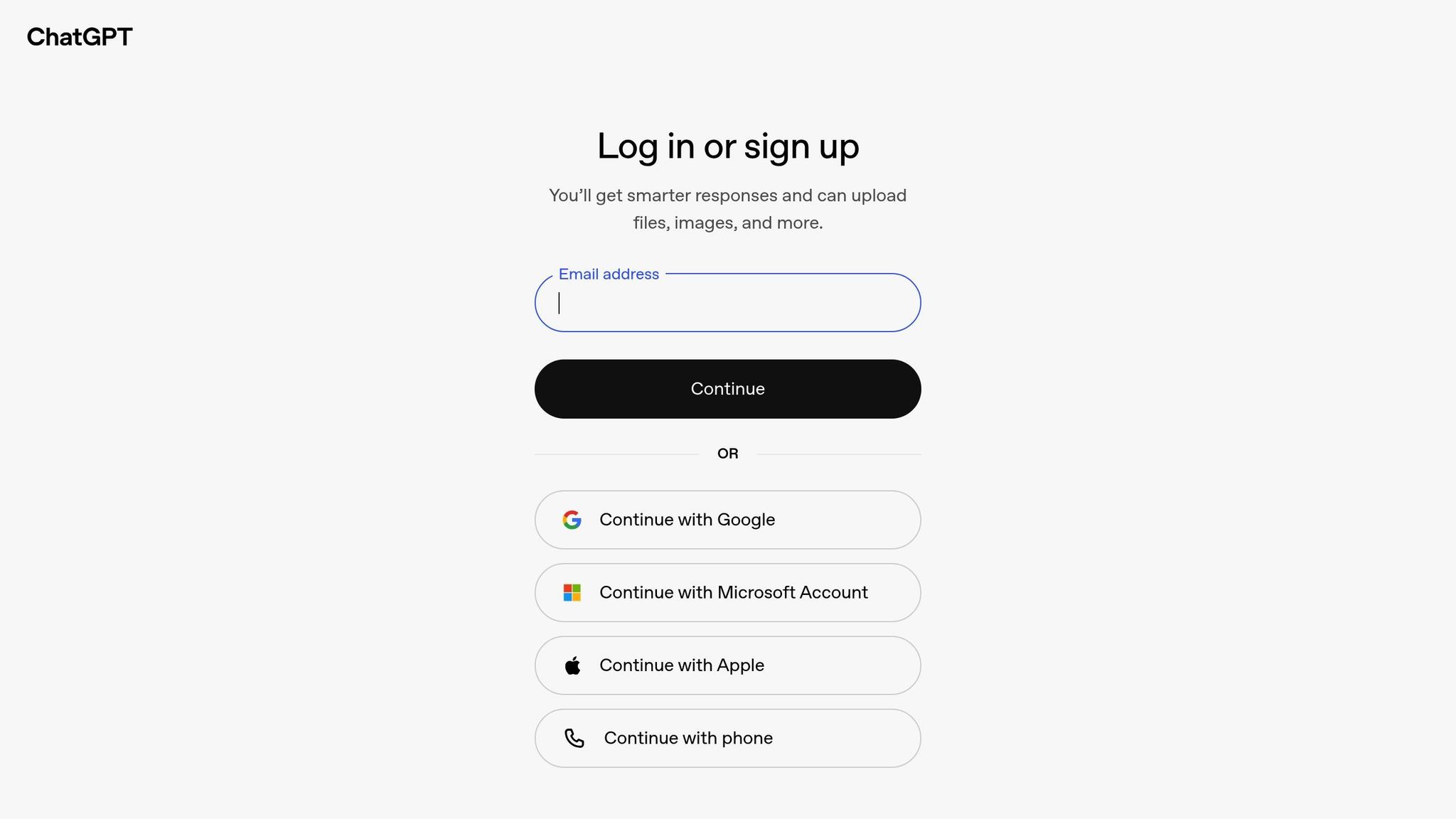
Building on earlier advancements like Quidget, ChatGPT has made a name for itself with its conversational abilities and seamless integration options. Developed by OpenAI, this AI chatbot is known for generating responses that feel natural and for handling multi-turn conversations with ease. Its ability to understand context makes it a powerful tool for automating customer interactions and supporting various content-related tasks.
Core Use Case
ChatGPT is widely used for tasks like content creation, answering customer queries, and streamlining internal processes. Businesses rely on it to draft emails, craft marketing content, and write product descriptions. It’s also a handy tool for brainstorming ideas or summarizing lengthy documents. These features make it a practical choice for a variety of professional needs.
AI Features
ChatGPT comes with a range of useful features:
- Supports communication in multiple languages.
- Can generate code snippets and assist with basic programming tasks.
- Summarizes long content effectively and simplifies technical concepts.
Integrations
With API access and third-party connectors, ChatGPT can be easily integrated into applications and customer service systems, enhancing its usability across different platforms.
Pricing
ChatGPT offers flexible pricing to cater to diverse needs. There’s a free tier, which provides basic access and is ideal for light use or testing. For faster response times and additional functionalities, users can opt for a paid subscription. Larger businesses can explore tailored enterprise solutions by contacting OpenAI directly.
3. Gemini (Google)
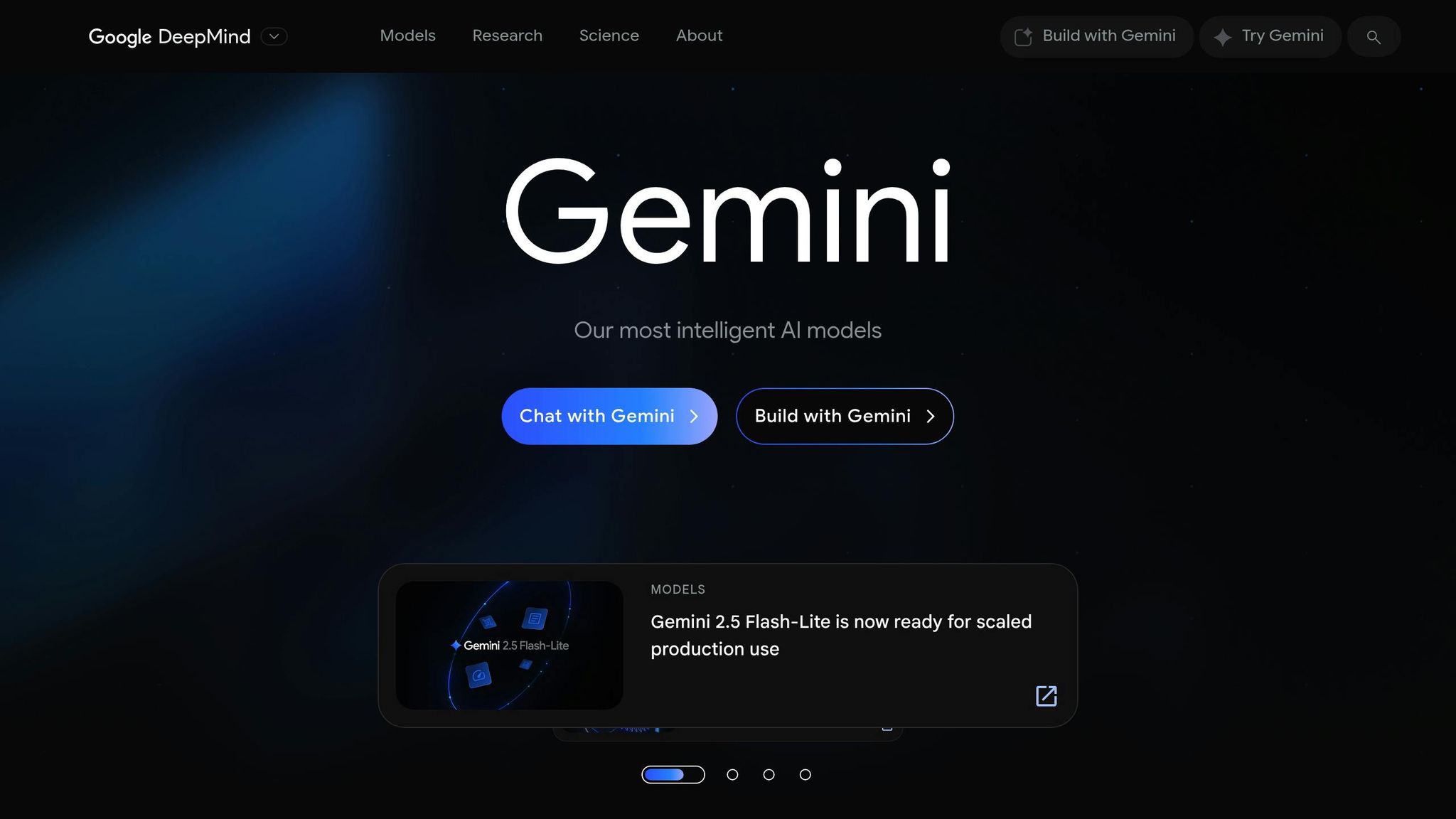
Google’s Gemini is a versatile AI chatbot platform capable of handling both text and image inputs. It’s designed to help businesses efficiently address a wide range of customer inquiries.
Core Use Case
Gemini shines in scenarios where customer support teams deal with queries that combine text and images. For instance, it can interpret an image or document sent alongside a question, making communication more precise and effective. Its multilingual capabilities are a bonus for companies catering to global audiences.
AI Features
What sets Gemini apart is its ability to seamlessly process text and images within the same conversation. It also simplifies complex inquiries by breaking them into easy-to-understand responses.
Integrations
Since Gemini is part of Google’s ecosystem, it integrates smoothly with various Google services. This makes it a natural fit for businesses already using Google’s tools, while also allowing for custom application development to streamline workflows.
Pricing
Google has yet to release pricing details for Gemini. More specifics are expected as the platform becomes more widely accessible.
4. Claude (Anthropic)
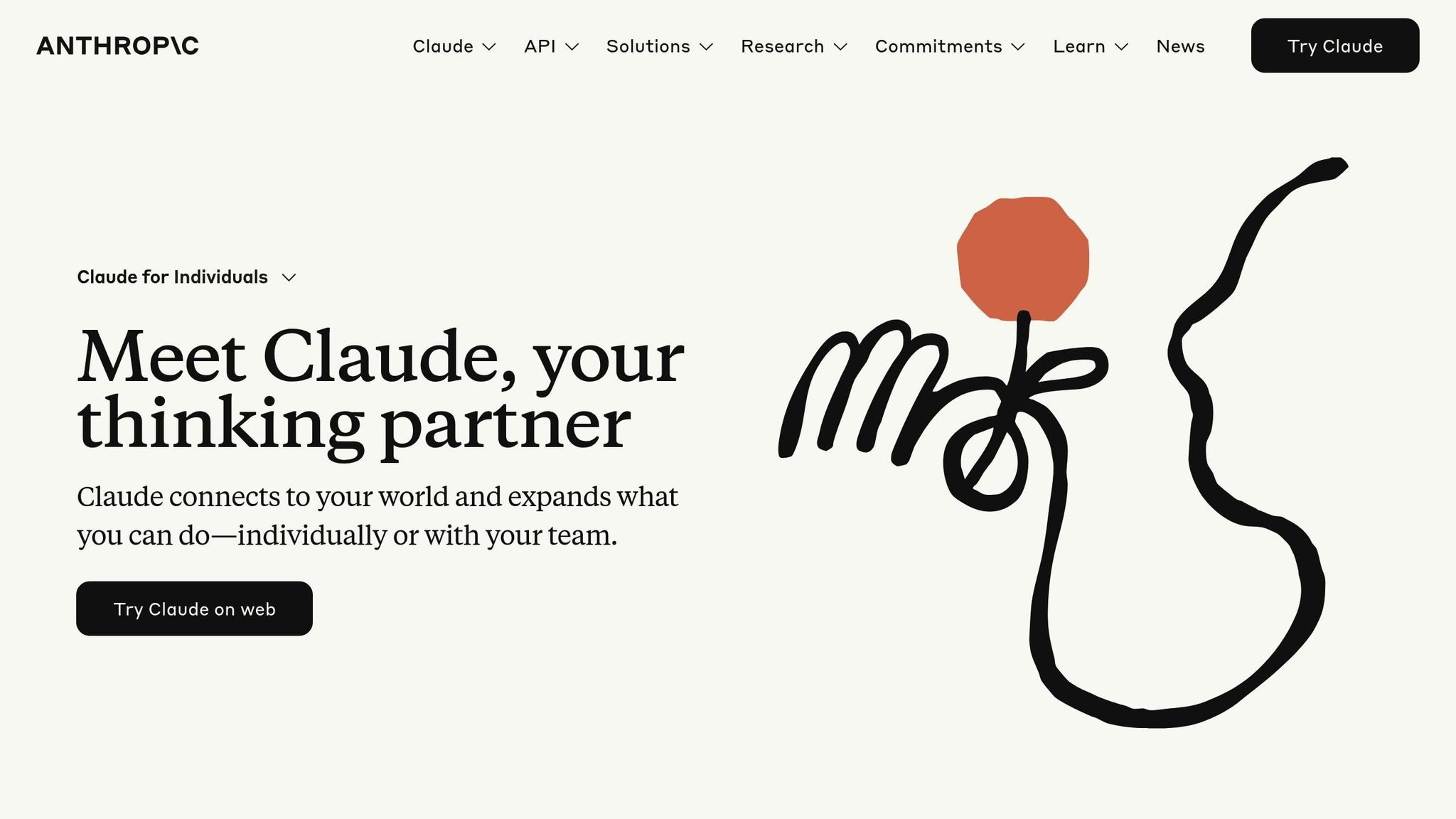
Claude is an AI chatbot platform designed with a focus on helpful, harmless, and honest communication. Created by Anthropic, it’s tailored for managing complex conversations in a way that’s both safe and reliable – qualities that make it an excellent choice for industries where precision and trust are critical.
Core Use Case
Claude shines in customer support roles that demand nuanced and accurate responses, especially when dealing with sensitive areas like healthcare, finance, or legal matters. It’s also a solid choice for sales interactions, where clear, pressure-free explanations can build trust – perfect for high-value purchases and B2B sales scenarios.
AI Features
What truly sets Claude apart is its Constitutional AI framework. This ensures the chatbot adheres to a set of guiding principles, reducing the chances of harmful or inappropriate responses.
Claude can process large volumes of information, handling up to 100,000 tokens in a single exchange. This allows it to maintain context over extended conversations and explain complex topics in a way that feels natural and human-like.
Integrations
Claude offers API access, enabling seamless integration with customer service platforms, websites, and mobile applications.
Although it doesn’t come with a wide range of pre-built integrations, its API flexibility allows it to connect with most CRM systems, help desk tools, and messaging platforms through custom development.
Pricing
Claude uses a pay-per-use model, charging based on the number of tokens processed. This makes it a budget-friendly option for startups and businesses looking to manage costs effectively.
The pricing is tiered depending on the model you choose. For faster, more cost-effective responses, Claude Instant is a good fit. For more complex reasoning, Claude 2 is available at a higher price point. Once businesses understand their typical usage, the costs become predictable and manageable.
5. Perplexity AI
Perplexity AI stands out by combining conversational AI with live web search, offering up-to-date answers and citing original sources for verification.
Core Use Case
This tool shines when you need current, accurate information fast. By including source citations, it ensures users can double-check the details – an essential feature for situations requiring timely and reliable answers.
In addition to sourcing real-time data, its technical framework enhances the quality of user interactions.
AI Features
Perplexity AI integrates live search, attaching source links directly to its responses. It’s also designed for multi-turn conversations, keeping track of context across multiple exchanges to tackle more in-depth questions effectively.
6. Intercom
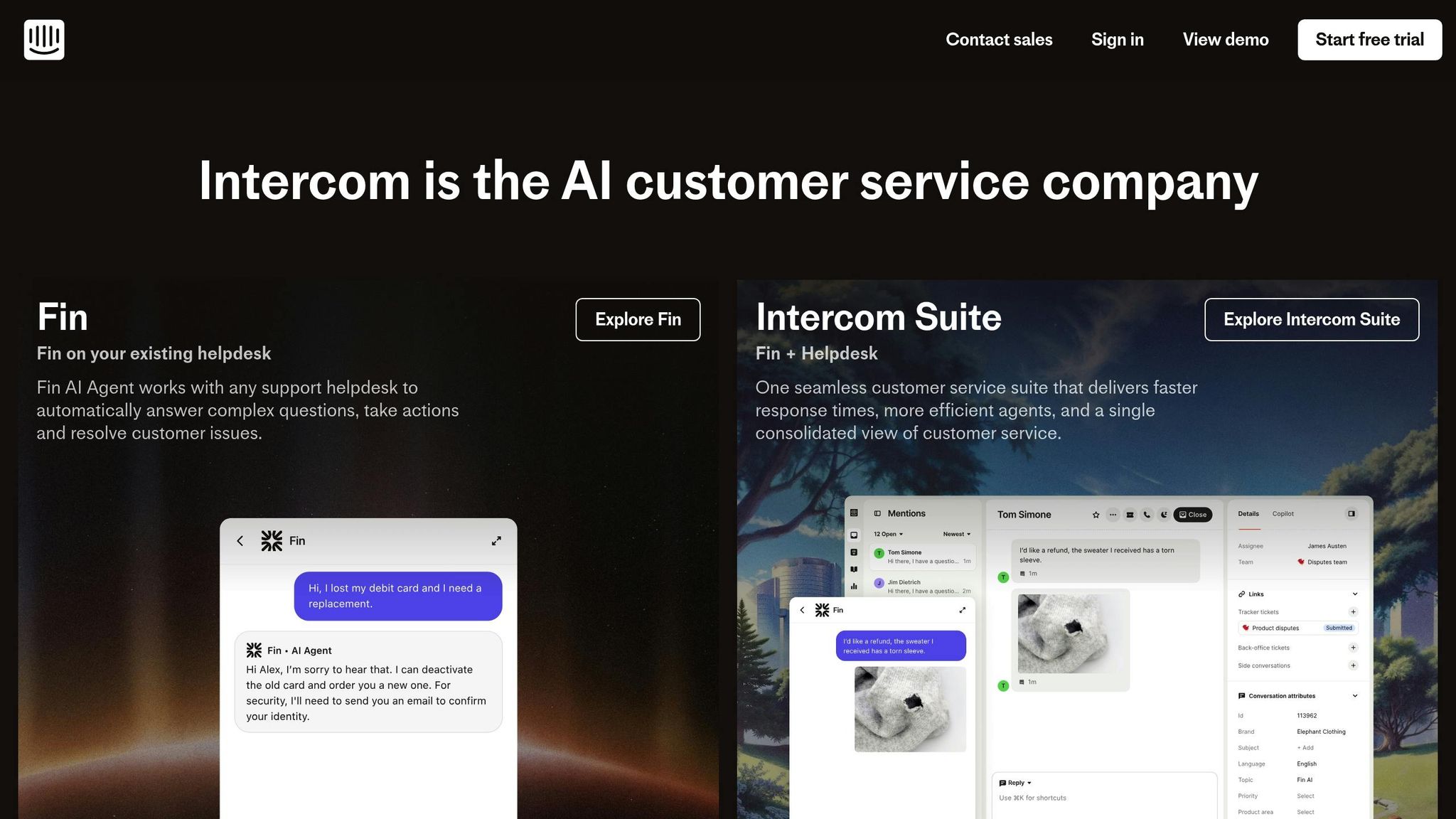
Intercom combines live chat with AI automation to handle high volumes of customer inquiries efficiently. It strikes a balance between automation and a personal touch, making it a great choice for businesses looking to scale without losing quality in customer interactions.
Core Use Case
Intercom is all about quick responses and smooth customer engagement. It’s particularly suited for businesses managing a large number of customer inquiries while maintaining a personal feel. By blending automated replies with seamless handoffs to human agents, Intercom helps reduce response times without compromising on customer experience. Over 25,000 companies worldwide, including Atlassian, Amazon, and Lyft Business, trust Intercom to enhance their customer support systems.
AI Features
Intercom’s AI tools are designed to streamline workflows. They can route messages based on urgency and content, while also suggesting automated responses to lighten the workload for customer support teams.
Integrations
Intercom integrates with popular CRMs like Salesforce and HubSpot, along with tools for analytics, e-commerce, and project management. These connections help centralize customer data and improve workflow efficiency.
Pricing
Intercom offers a subscription-based pricing model that adjusts based on team size and feature needs. Businesses can take advantage of a 14-day free trial to explore the platform before making a decision.
sbb-itb-58cc2bf
7. Birdeye
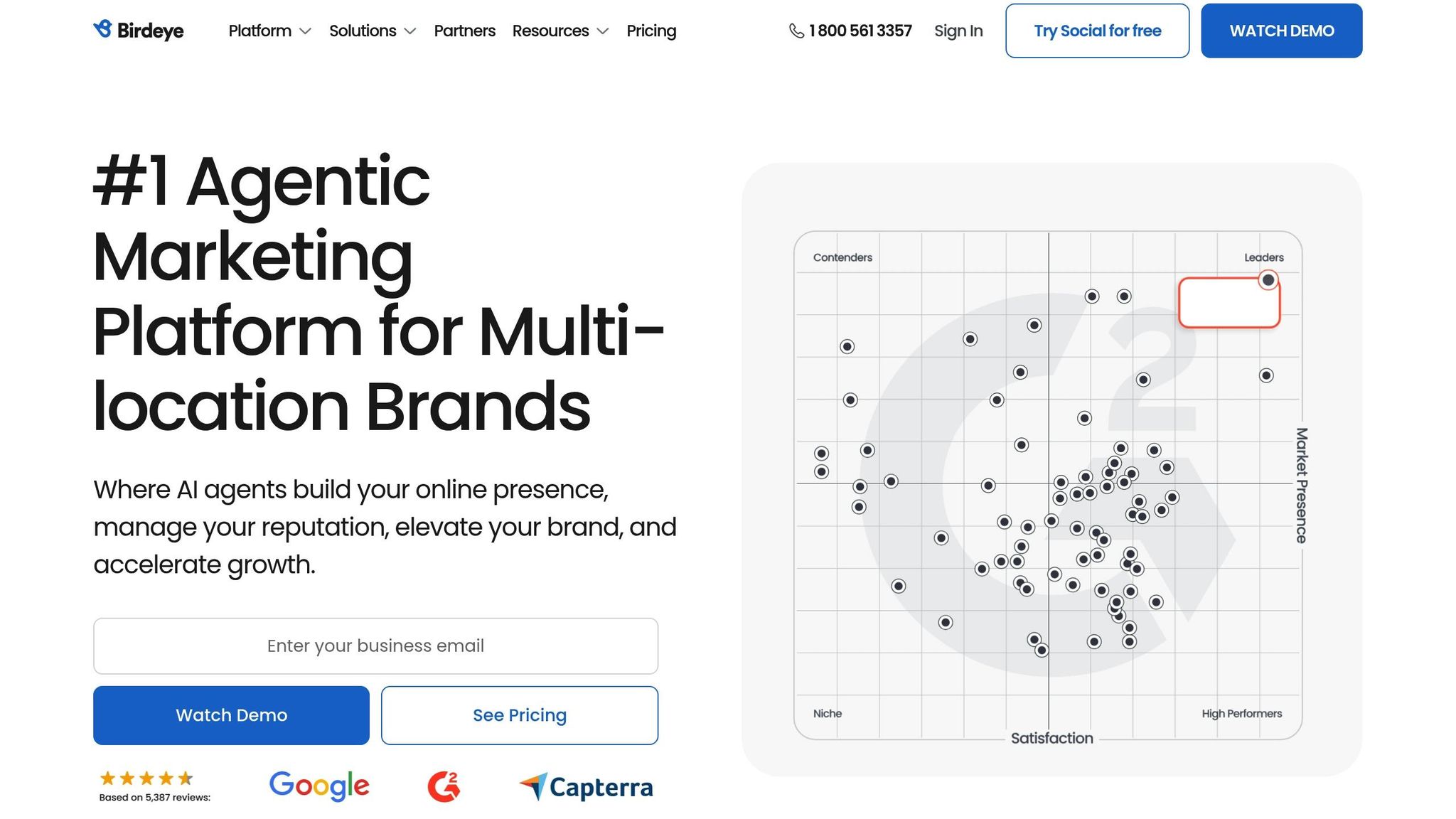
Birdeye is designed to help businesses manage their reputation and improve customer experiences. With its AI chatbot, it simplifies handling reviews, feedback, and customer interactions across various platforms.
Core Use Case
Birdeye shines in assisting businesses to gather and respond to customer feedback efficiently. It’s especially useful for service-driven industries like healthcare, automotive, and retail, where monitoring reviews and engaging with customers is essential. The platform’s AI chatbot not only manages initial customer inquiries but also prompts satisfied customers to leave reviews, boosting a business’s online reputation.
AI Features
Birdeye’s AI is tailored to streamline review management and customer communication. Its chatbot can assess customer sentiment, prioritize conversations based on urgency, and automatically request reviews from happy customers. Additionally, the AI analyzes feedback trends, helping businesses pinpoint recurring issues and areas for improvement.
Integrations
Birdeye integrates with over 3,000 business tools, including major CRM systems, scheduling software, and social media platforms. It works seamlessly with Google My Business, Facebook, and other review sites, ensuring centralized reputation management. Popular tools like Salesforce and QuickBooks also sync with Birdeye, making communication and reputation management more efficient.
Pricing
Birdeye offers custom pricing tailored to the size of the business and the features needed. While there’s no free plan, businesses can explore its value through demos and consultations. Pricing generally depends on the number of locations and review sources a business wants to manage, making it scalable to specific needs.
8. Tidio
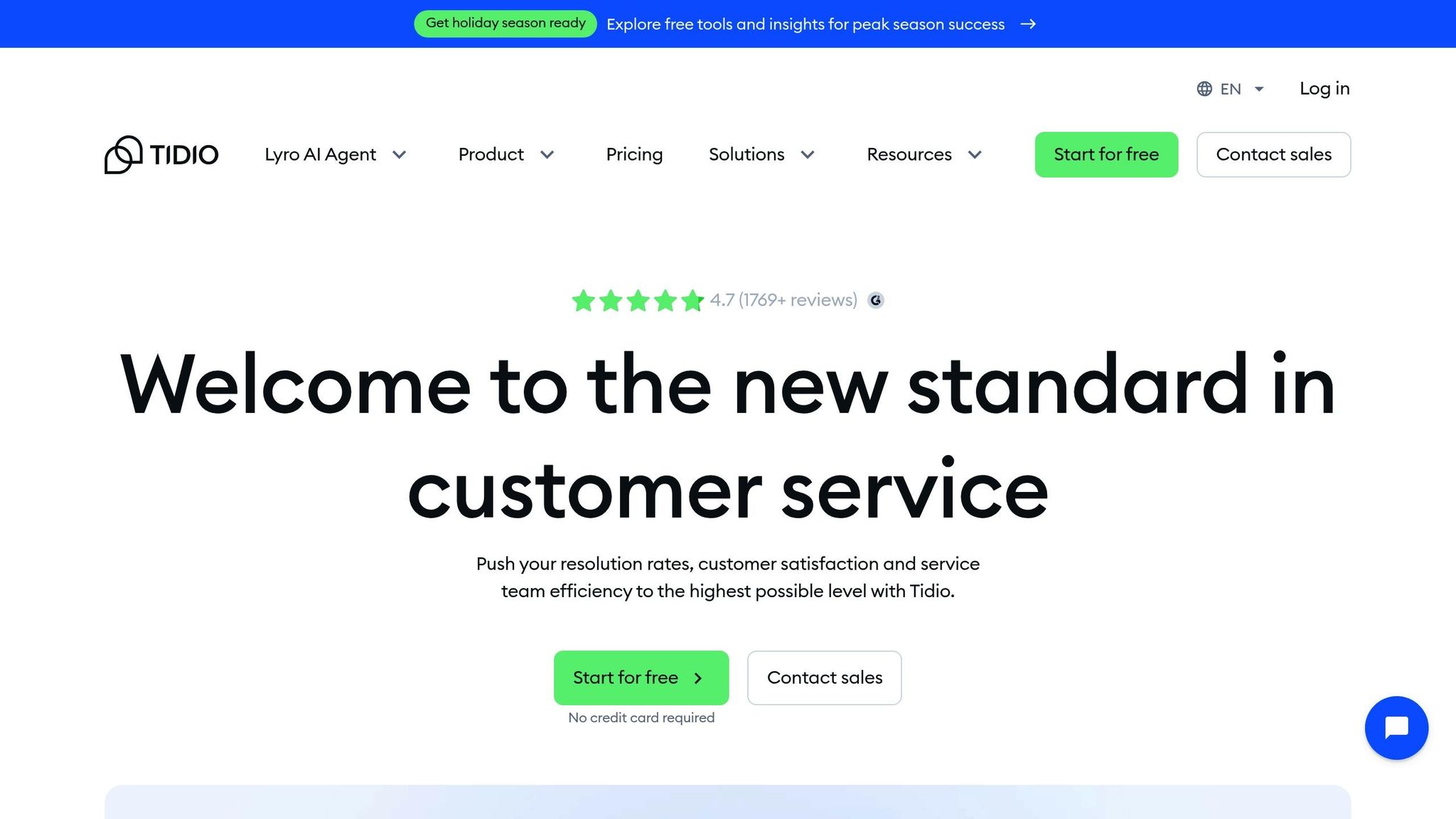
Tidio is a versatile tool designed for small to medium-sized businesses looking to enhance how they communicate with customers. By combining live chat with AI-powered automation, it’s especially useful for e-commerce stores and service-oriented businesses that need fast, efficient customer support.
Core Use Case
Tidio helps turn website visitors into paying customers through real-time chat. E-commerce businesses often rely on it to handle product questions, assist during checkout, and recover abandoned carts. It takes care of routine inquiries – like business hours, shipping details, and return policies – while forwarding more complex issues to human agents during business hours. Its tailored features make it a strong fit for businesses with specific customer service needs.
AI Features
Tidio’s AI chatbot is built for conversational commerce. It can understand customer intent in multiple languages and provide answers based on your website’s content and FAQ sections. Over time, the bot learns from previous interactions, refining its responses. With features like sentiment analysis, it can detect when a customer might need help from a live agent, while automated triggers launch chat flows based on visitor behavior. For added flexibility, the platform includes a visual flow builder, so even non-technical users can design custom conversation paths without writing any code.
Integrations
Tidio connects seamlessly with platforms like Shopify, WooCommerce, BigCommerce, Magento, Mailchimp, Klaviyo, HubSpot, and Pipedrive. Through Zapier, it links to thousands of other apps, enabling tasks like order tracking and contact management. CRM integrations automatically create contact records, streamlining customer data management and boosting efficiency.
Pricing
Tidio provides a free plan with basic chat features, making it a great starting point for startups. For businesses needing more advanced functionality, paid plans unlock additional automation tools and wider integration options, allowing you to choose a plan that aligns with your goals.
9. Drift by Salesloft
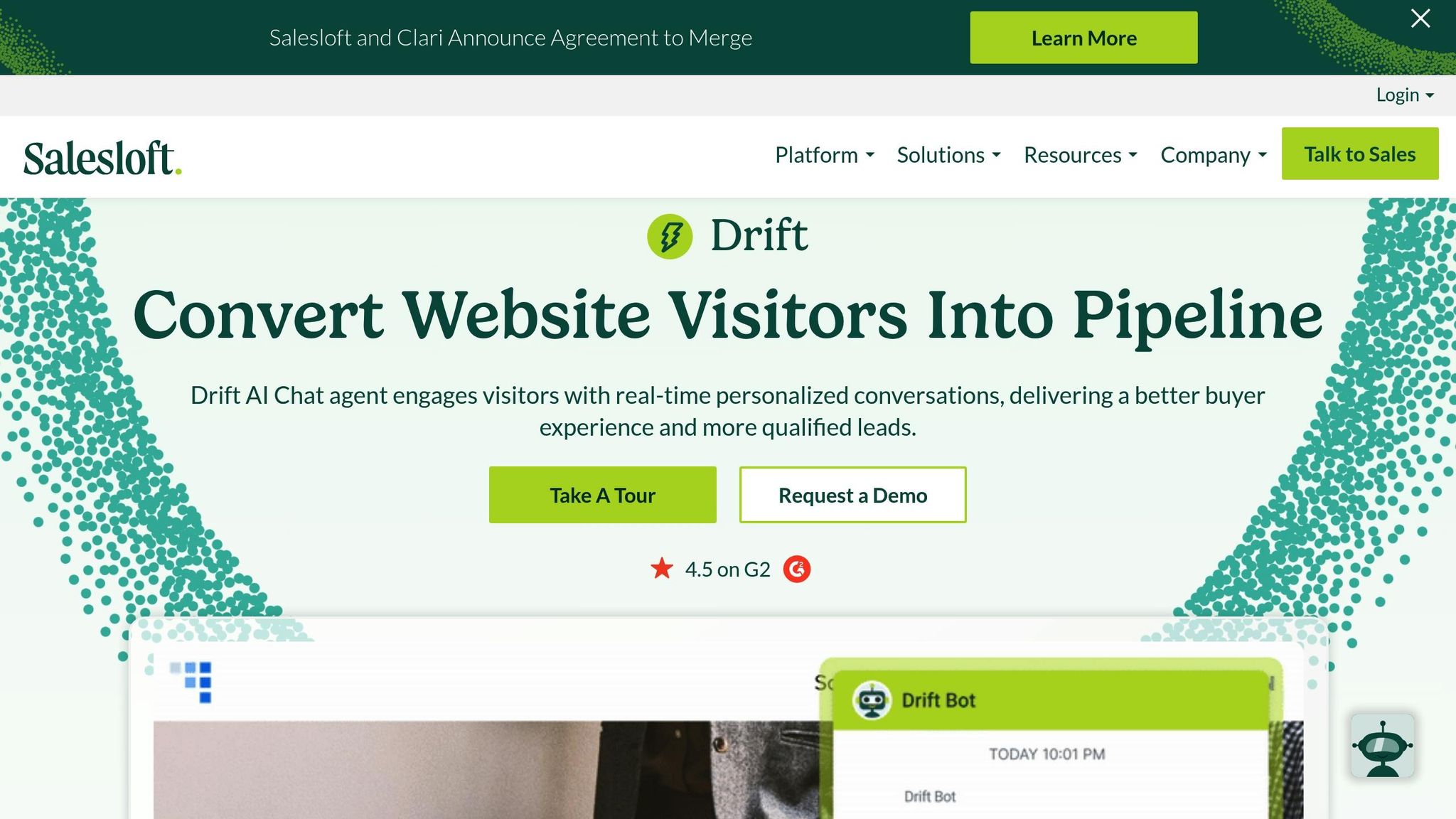
Drift is designed to do more than just chat – it’s built to drive revenue by combining conversational marketing with real-time lead qualification. What makes it stand out? Its ability to engage website visitors in meaningful conversations that convert them into qualified leads, all while keeping the process seamless for sales and marketing teams.
Drift is tailored for B2B companies, allowing sales teams to schedule meetings directly during chat sessions and enabling marketing teams to pre-qualify prospects before they enter the sales funnel.
Core Use Case
Drift excels in conversational sales for B2B businesses. Instead of relying on traditional, lengthy contact forms, it starts conversations the moment a prospect shows interest. This is especially effective for industries like SaaS, professional services, and technology, where nurturing leads through multiple touchpoints is essential due to longer sales cycles.
For example, Drift can trigger personalized chats when visitors explore pricing or product pages, ensuring timely engagement with potential buyers.
AI Features
Drift’s AI capabilities are all about smarter lead handling. It asks qualifying questions upfront, ensuring only the most promising leads make it to your sales team. The AI can juggle multiple conversations at once, maintaining context even during extended chats.
Other standout features include predictive lead scoring, which evaluates visitor behavior and engagement history to identify high-priority prospects. The AI also detects buying signals during chats and updates lead profiles in your CRM automatically. For businesses operating globally, Drift supports multilingual conversations and routes chats based on language preferences or time zones.
Integrations
Drift plays well with other tools in your sales and marketing stack. It integrates with platforms like Salesforce, HubSpot, Marketo, Pardot, and Outreach, ensuring all your conversation data, lead details, and meeting bookings stay synchronized. Plus, its calendar integrations with tools like Calendly, Google Calendar, and Outlook let prospects book meetings directly through the chat interface, streamlining the process even further.
Pricing
Drift uses a subscription-based pricing model, with tiers that scale based on features and contact volume. While there’s no free plan, businesses can take advantage of free trials to see if it’s the right fit. Plans start at a few hundred dollars per month, making Drift a better option for established companies with dedicated sales teams rather than early-stage startups. Costs increase with advanced features like AI-driven lead scoring, enhanced integrations, and custom reporting capabilities.
10. Freshchat by Freshworks
Freshchat is a customer messaging platform that bridges traditional support tickets with modern, context-rich conversations across websites, apps, and social media channels.
This platform is designed for businesses looking to go beyond basic chat widgets. Freshchat ensures every interaction is part of a larger customer journey by retaining history and context across all channels.
Core Use Case
Freshchat is built for omnichannel support, making it a strong choice for e-commerce companies, SaaS businesses, and service providers. It’s particularly effective for handling complex customer inquiries that may involve follow-ups or require escalation.
One of its standout features is its ability to maintain conversation continuity across platforms. For example, a customer might start a chat on your website during the day and later switch to WhatsApp in the evening. Freshchat keeps the entire conversation thread intact, ensuring seamless communication.
AI Features
Freshchat uses AI to streamline customer interactions. Its intelligent routing analyzes incoming messages to determine intent and directs them to the most suitable team member based on expertise, availability, and workload.
The platform offers predictive contact scoring, helping businesses identify high-value customers and prioritize their conversations. AI also monitors customer sentiment in real time, alerting agents if a conversation is likely to escalate. For global businesses, Freshchat supports real-time translation in 33 languages, enabling agents to communicate effortlessly without needing extra tools.
Integrations
Freshchat integrates with popular tools like Salesforce, HubSpot, Shopify, Slack, and Microsoft Teams. Its bi-directional data sync ensures smooth sharing of customer details, conversation histories, and support tickets across platforms.
It also connects with social messaging apps such as WhatsApp Business, Facebook Messenger, and Apple Business Chat, allowing businesses to manage all interactions from a single dashboard. If you’re already using Freshworks products, Freshchat works seamlessly with Freshdesk and Freshsales, creating a unified experience for both support and sales teams. Flexible integration options make it easy to tailor Freshchat to your specific business needs.
Pricing
Freshchat offers a free plan for up to 10 agents, which includes basic chat functionality – perfect for small businesses and startups. Paid plans begin at $15 per agent per month with the Growth plan, which unlocks features like advanced reporting, custom roles, and API access.
The Pro plan, priced at $39 per agent per month, adds AI-driven features, advanced integrations, and priority support. For larger businesses, the Enterprise plan costs $69 per agent per month and includes custom reporting, enhanced security, and dedicated account management. All paid plans come with a 21-day free trial and are billed annually.
Platform Comparison Table
The table below provides a side-by-side overview of key features, pricing, and trade-offs for popular platforms.
| Platform | Starting Price | Best For | Strengths | Limitations |
|---|---|---|---|---|
| Quidget | $16/month | Small to medium businesses | Easy no-code setup, supports 45+ languages, hybrid AI/human support | None |
| ChatGPT | $20/month | Content creation, general conversations | Advanced reasoning, creative tasks, broad knowledge base | Lacks built-in business integrations |
| Gemini | Free (paid plans available) | Google Workspace users | Seamless Google integration, multimodal capabilities | N/A |
| Claude | $20/month | Document analysis, coding | Strong safety features, great for long-form content | Limited real-time data access |
| Perplexity AI | $20/month | Research, fact-checking | Real-time web search, source citations | Not built for customer support |
| Intercom | $39/month | Customer support automation | Powerful workflow automation, CRM integration | Higher price point for smaller businesses |
| Birdeye | Custom pricing | Multi-location businesses | Reputation management, review automation | Pricing structure can be complex |
| Tidio | Free (paid from $29/month) | E-commerce stores | Shopify integration, drag-and-drop flow builder | Limited AI sophistication |
| Drift by Salesloft | $2,500/month | Enterprise sales teams | Advanced lead qualification, sales automation | Prohibitively expensive for smaller companies |
| Freshchat by Freshworks | Free (paid from $15/month) | Omnichannel support | Cross-platform continuity, sentiment analysis | Overkill for simpler use cases |
Pricing Breakdown by Business Size
Here’s a quick guide to match pricing tiers with your business size and needs:
- Startups: Free or low-cost options are ideal, such as Tidio’s free plan, Quidget starting at $16/month, or Freshchat’s free tier (for teams under 10 agents).
- Small to Growing Businesses: More advanced packages like Quidget Pro at $79/month, Intercom at $39/month, or Freshchat Growth at $15/agent offer scalability.
- Enterprises: High-end solutions like Drift by Salesloft ($2,500/month), Birdeye (custom pricing), or Quidget Pro Plus ($210/month) cater to large-scale operations and extensive customization needs.
Key Takeaways
Each platform serves unique business needs, focusing on customer support, sales, and integration capabilities. For AI-driven tasks, ChatGPT, Claude, and Gemini stand out, but they often require additional technical setup for business purposes. On the other hand, platforms like Quidget, Intercom, and Freshchat integrate seamlessly with essential business tools, offering smooth workflows.
If ease of use is your top priority, Quidget and Tidio are beginner-friendly and require no technical expertise. Platforms like Freshchat and Quidget also shine in maintaining conversations across channels like WhatsApp, Slack, and website chat. For businesses prioritizing advanced AI capabilities, ChatGPT and Claude are excellent choices, though they may need some API integration work.
Ultimately, your choice should align with your primary goals – whether that’s cutting-edge AI, seamless business integration, or a simple, no-fuss setup. For customer interactions, platforms specifically designed for engagement tend to deliver better results than general-purpose AI tools.
What Most People Get Wrong About AI Chatbot Platforms
AI chatbots are often misunderstood by businesses, leading to poor deployment, frustrated customers, and wasted resources. These misconceptions can result in inefficient setups and missed opportunities to improve customer interactions.
All AI Chatbots Are Not the Same
AI chatbot platforms vary widely in their capabilities. For example, ChatGPT is known for handling general conversations and multimodal tasks, whereas platforms like Quidget are designed specifically for customer support, offering features like human handoff and CRM integration. Each platform serves a distinct purpose, tailored to different business needs.
In 2025, the top 10 AI chatbots accounted for 58.8% of nearly 100 billion web visits, spanning over 10,500 tools. The industry also saw an impressive 123.35% year-over-year growth. This rapid expansion underscores the variety of platforms available, each addressing unique requirements.
Understanding these differences is essential to avoid common missteps when selecting a chatbot platform.
The "Set It and Forget It" Misconception
Many businesses mistakenly believe that chatbots will function perfectly without ongoing effort. However, successful chatbots require regular training and monitoring. For instance, a retail company using Botpress trained its chatbot on its product catalog and return policies. This allowed the bot to handle detailed inventory questions and manage returns effectively.
By training chatbots on company-specific data, businesses can ensure accurate, relevant, and on-brand responses. Platforms like Quidget allow businesses to upload custom knowledge bases, enabling the chatbot to understand unique products, policies, and customer needs. Without this training, chatbots risk providing generic or incorrect answers, frustrating users.
The Myth of Replacing Humans
A common misconception is that chatbots can entirely replace human agents, even in complex or sensitive scenarios. According to a 2023 Salesforce study, while 59% of customers prefer self-service tools for simple issues, 71% still want access to a human agent for more complicated problems.
Leading chatbot platforms address this with human handoff features, ensuring that customers can seamlessly transition to a human agent when needed. This balance helps maintain service quality and customer trust.
Overlooking the Risk of Mistakes
Another mistake is assuming that AI chatbots are infallible. Without proper oversight, chatbots can misinterpret context or provide incorrect responses. Generic AI bots often fail to understand company-specific terminology or handle complex queries, which can lead to impersonal or inaccurate answers and erode customer confidence.
Underestimating Technical Complexity
Some businesses are caught off guard by the technical requirements of deploying a chatbot. While platforms like Quidget offer no-code solutions, others may require API integration or more advanced technical setup. This complexity often becomes apparent only after implementation.
Choosing a platform that aligns with your technical expertise and business needs is critical. Additionally, setting clear expectations about what the chatbot can and cannot do – and providing easy access to human support – can help maintain customer satisfaction.
Conclusion
AI chatbot platforms have revolutionized how businesses handle customer interactions. By managing routine inquiries, these tools allow teams to focus on more complex issues. Companies using AI chatbots have reported up to a 30% drop in customer support costs and a 25% boost in customer satisfaction scores. These benefits not only reduce expenses but also improve customer engagement.
What makes AI chatbots so effective? They provide instant, personalized, and round-the-clock support across a variety of channels, including websites, WhatsApp, and Slack. They can recall past conversations for continuity and seamlessly transfer complicated cases to human agents when necessary.
The numbers speak for themselves. A 2024 Gartner report highlights the rapid adoption of AI chatbots, revealing that 70% of customer interactions in top e-commerce and SaaS companies are now handled by these tools. The industry is projected to grow by 123% year-over-year in 2025, with leading platforms managing nearly 60% of 100 billion web visits.
The key to success lies in selecting the right platform tailored to your needs. Features like knowledge base training, multi-language support, and CRM integration make these tools adaptable for businesses of all sizes. Many platforms even offer free trials, giving you the chance to test their capabilities before making a commitment.
Ready to see the difference for yourself? Start with a 7-day free trial of Quidget and discover how it can transform your customer support.
FAQs
What’s the difference between AI chatbot platforms for handling routine tasks and complex customer queries?
AI chatbot platforms vary significantly in their capabilities, particularly when it comes to handling simple versus more intricate customer interactions.
Basic platforms excel at managing straightforward, repetitive tasks. Think of things like answering FAQs, providing updates on orders, or sharing business hours. They’re efficient for these purposes but have a limited range of functionality.
Advanced platforms, however, take things to the next level by leveraging natural language understanding (NLU) and machine learning. This allows them to handle more complex inquiries, interpret multi-step questions, and provide responses tailored to the individual. These features make them a better fit for businesses looking to create more meaningful and personalized interactions with their customers.
What should businesses look for when choosing the right AI chatbot platform?
When choosing an AI chatbot platform, it’s essential to ensure it matches your business goals. Here are some key aspects to evaluate:
- Customization: Can the platform be adapted for your specific needs, like customer support, sales, or onboarding processes?
- Integration: Will it connect smoothly with the tools and systems you already use?
- Scalability: Is the platform capable of growing alongside your business as your demands increase?
- Features: Check for must-have capabilities like analytics, multi-channel support, and training options to optimize performance.
Also, take a close look at the pricing structure. Does it offer a free trial or flexible payment plans? Opt for platforms that are straightforward to use and clearly contribute to achieving your objectives.
How can businesses integrate AI chatbots with their CRM and communication tools to improve customer interactions?
To seamlessly integrate AI chatbots with your CRM and communication tools, opt for a platform that easily connects with systems like Salesforce or HubSpot. This allows for real-time data sharing, enabling more personalized and efficient customer interactions.
Use the chatbot to handle repetitive tasks, such as responding to FAQs or updating customer records, while ensuring it fits smoothly into your existing workflows. Look for platforms that offer flexibility and room to grow, so they can adapt to your business requirements. This integration can deliver around-the-clock support, enhance data accuracy, and elevate customer satisfaction.


